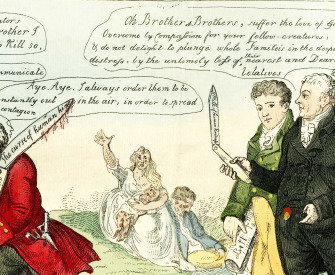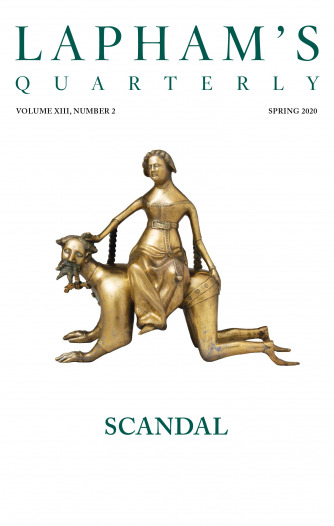A righteous man regardeth the life of his beast.
—The Bible,All Things Are Moral
Ralph Waldo Emerson sees the unity of all things.
Nature is thoroughly mediate. It is made to serve. It receives the dominion of man as meekly as the ass on which the Savior rode. It offers all its kingdoms to man as the raw material which he may mould into what is useful. Man is never weary of working it up. He forges the subtile and delicate air into wise and melodious words, and gives them wing as angels of persuasion and command. One after another his victorious thought comes up with and reduces all things, until the world becomes at last only a realized will—the double of the man.
Sensible objects conform to the premonitions of reason and reflect the conscience. All things are moral, and in their boundless changes have an unceasing reference to spiritual nature. Therefore is nature glorious with form, color, and motion; that every globe in the remotest heaven, every chemical change from the rudest crystal up to the laws of life, every change of vegetation from the first principle of growth in the eye of a leaf, to the tropical forest and antediluvian coal mine, every animal function from the sponge up to Hercules, shall hint or thunder to man the laws of right and wrong, and echo the Ten Commandments. Therefore is nature ever the ally of religion: lends all her pomp and riches to the religious sentiment. Prophet and priest, David, Isaiah, Jesus, have drawn deeply from this source. This ethical character so penetrates the bone and marrow of nature, as to seem the end for which it was made. Whatever private purpose is answered by any member or part, this is its public and universal function, and is never omitted. Nothing in nature is exhausted in its first use. When a thing has served an end to the uttermost, it is wholly new for an ulterior service. In God, every end is converted into a new means. Thus the use of commodity, regarded by itself, is mean and squalid. But it is to the mind an education in the doctrine of use, namely, that a thing is good only so far as it serves; that a conspiring of parts and efforts to the production of an end is essential to any being. The first and gross manifestation of this truth is our inevitable and hated training in values and wants, in corn and meat.
It has already been illustrated that every natural process is a version of a moral sentence. The moral law lies at the center of nature and radiates to the circumference. It is the pith and marrow of every substance, every relation, and every process. All things with which we deal preach to us. What is a farm but a mute gospel? The chaff and the wheat, weeds and plants, blight, rain, insects, sun—it is a sacred emblem from the first furrow of spring to the last stack which the snow of winter overtakes in the fields. But the sailor, the shepherd, the miner, the merchant, in their several resorts, have each an experience precisely parallel and leading to the same conclusion, because all organizations are radically alike. Nor can it be doubted that this moral sentiment which thus scents the air, grows in the grain, and impregnates the waters of the world is caught by man and sinks into his soul. The moral influence of nature upon every individual is that amount of truth which it illustrates to him. Who can estimate this? Who can guess how much firmness the sea-beaten rock has taught the fisherman? How much tranquility has been reflected to man from the azure sky, over whose unspotted deeps the winds forevermore drive flocks of stormy clouds and leave no wrinkle or stain? How much industry and providence and affection we have caught from the pantomime of brutes? What a searching preacher of self-command is the varying phenomenon of health!
Herein is especially apprehended the unity of nature—the unity in variety—which meets us everywhere. All the endless variety of things make an identical impression. Xenophanes complained in his old age that, look where he would, all things hastened back to unity. He was weary of seeing the same entity in the tedious variety of forms. The fable of Proteus has a cordial truth. A leaf, a drop, a crystal, a moment of time, is related to the whole and partakes of the perfection of the whole. Each particle is a microcosm and faithfully renders the likeness of the world.

Ralph Waldo Emerson
From Nature. Mourning his wife’s death and influenced by his visits to Samuel Taylor Coleridge and William Wordsworth in 1832, Emerson replaced his wavering faith in God’s miracles with the cordial truth found in the bone and marrow of nature. He began writing the essay near the banks of the Sudbury River in 1833; published anonymously three years later, it became the founding text of American Transcendentalism.


